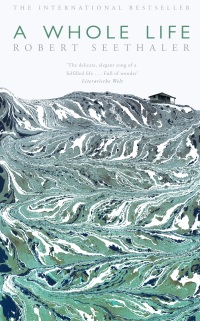 Winner of the 2015 Grimmelshausen Prize
Winner of the 2015 Grimmelshausen Prize
Translated from German by Charlotte Collins
Atop the mountain depicted on the dust jacket sits a modest wooden hut. This is the hand-built home of Andreas Egger, a man whose spends most of his life eking out an existence in the mountain valley.
His life is hard. He is brought up by his uncle, treated more as a farm hand than a family member, and beaten so cruelly that he is left with a permanent injury. When the worm turns, as it always does, he must fend for himself. With no clear ambitions, he manages to do this, hiring himself out as a farmhand, as a labourer building cable cars. The high point of his life is lived with his wife in the aforementioned hut. Yet this happiness is short-lived. The mountain proves to be an even harsher master than his uncle ….
The great avalanche of 1935 causes Andreas to move away from the valley to build more cable cars and eventually to go to war. Following years as a Soviet POW, he returns to a different world. Life is now dictated by the demands of the tourist industry. For years, he struggles to come to terms with this until a serendipitous event leads to the mountain paying back some slight compensation for the losses sustained decades before.
For the most part Andreas’s is a solitary existence – imposed at times, chosen at others. He doesn’t even turn to the television for company – watching it only on two recorded occasions. As he grows old in poverty, increasingly unkempt, increasingly intolerant of other humans and their chatter, he becomes the mad old man of the village. He is aware of how others see him but is indifferent. He faces death with the same stoicism he has displayed throughout his life.
He couldn’t remember where he had come from and ultimately he didn’t know where he would go. But he could look back without regret on the time inbetween, his life, with a full-throated laugh and utter amazement.
That’s not how I react to his life. In fact, in many places I found tragedy and I often felt profound melancholy. I said before that he had no clear ambitions. Actually that’s not entirely accurate – there is one, heartbreaking in its modesty and execution. I won’t reveal so as not to diminish the poignacy of its effect when you read for yourself. But does my reaction to Andreas’s life reveal my own lack of wisdom more than anything else? And is the underlying message of Seethaler’s piece that unreasonable expectation is the source of our contemporary ills?
Even though I’ve not mentioned it, landscape plays as important a role as the main character. The 3rd person narrative is both visual and fluid. There’s not much dialogue, but then the main character isn’t very talkative. Nevertheless this is a slim, easily read and thought-provoking read, which strikes me as a perfect companion to Christa Wolf’s August.
I read a review of this book by a German blogger, who said how quiet, understated this is, yet it really gets under your skin. You have confirmed that I was right to put it on my TBR list.
Wow! What a cover. The book sounds great as well. Is it a novel or autobiography?
Novel.
Your review brought ‘Stoner’ by John Williams to mind for some reason. Maybe the stoicism and endurance! Anyway it sounds excellent.
I’ve been meaning to read Stoner for ages, so thanks for the reminder.
You manage to find books which are just up my street. This one is reasonably priced on Kindle so I’ve got the sample and will see how I get on with it. Thanks!
I’m considering this for my book club. Your review certainly suggests there’s much to discuss. I hadn’t heard of book or writer and simply came across it in a bookshop by chance.
I just finished reading the French translation of this (which lacks that mesmerizing cover, unfortunately). I thought it was terrific, a remarkable condensation of a “whole life” that manages to touch on so many aspects of the world through which Eggers passes. The early part of the novel seems right out of Seethaler’s fellow Austrian writer Franz Innerhofer’s Beautiful Days, and the atmosphere also reminded me a great deal of the alpine novels of Swiss writer C.-F. Ramuz.
Two comments mentioning the cover … It must be special, and the more I think about it, it is. The narrative may be, as others have said, understated, but the changes that encompass it are not. The mountain is a seething mass, constantly in transition. Fluid, even, more like the waves of the sea, than a rockmass.
Thanks, too for the comparisons, Scott. Two more authors for me to investigate.
Love the sound of this, it stood out for me on the longlist, great review Lizzy, thank you, so good to see quite a few have read it already, thanks to German Lit Month!
Brilliant review, Lizzy! I loved this sentence from your review – “For the most part Andreas’s is a solitary existence – imposed at times, chosen at others.” And this sentence made me smile – “There’s not much dialogue, but then the main character isn’t very talkative.” 🙂